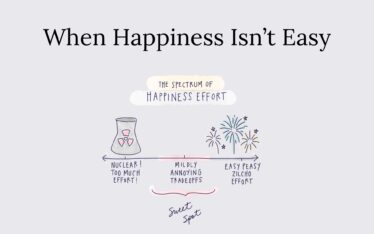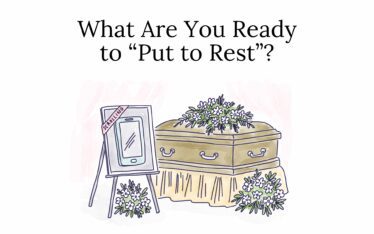Gratitude. It’s a heavy hitter in the positive psychology world — in fierce competition with optimism as the most scientifically studied well-being construct out there. We’ll let the researchers duke it out in the lab, and in the meantime we’ll all benefit from the abundance of studies that tell us how thankful we need to be for gratitude (get it?!), because it makes our lives undeniably better.
In one study, participants who completed a gratitude journal for just one week experienced a well-being boost of 9% and a dip in depressive symptoms by 27%… six months after the intervention. Grateful people are more satisfied with their lives, are more agreeable and open-minded, have deeper and more forgiving relationships, have greater self-control (and discipline to not eat all the Skittles in one sitting, except maybe for the red ones), boosted self-esteem, less stress, improved physical health and better sleep.
Thanksgiving is about six months away to the day (11/25 in the US) — so at the half yard line, let’s do a little “how appreciative are you” check-in, okay friends?
There are eight aspects of appreciation that thankfully a couple of smart scientists boiled down into The Appreciation Scale (adapted from Adler & Fagley, 2005). Here’s your chance to see where you’re gloriously appreciative, and also where you’re a hideous monster that takes the good things in your life for granted. Because as they say, the first step toward positive change involves learning where you’re an unappreciative ass. The good news is that appreciation is something people can learn over time, so there’s even hope for the ingrates among us.
The Appreciation Scale
Review the questions below and highlight two things: a) where you’re already extraordinarily grateful, and b) where you’re sorely lacking in appreciation.
“Have” Focus
1. I am very thankful for my degree of physical health.
2. I count my blessings for what I have in this world.
3. I remind myself how fortunate I am to have the privileges and opportunities I have encountered in life.
4. I reflect on how fortunate I am to have basic things in life like food, clothing, and shelter.
5. I really notice and acknowledge the good things I get in life.
6. I am content with what I have.
7. It is important to appreciate things such as health, family, and friends.
8. Although I don’t have everything I want, I am thankful for what I have.
9. I remind myself to think about the good things I have in my life.
10. I appreciate my degree of success in life so far.
Awe
11. I get caught up in the wonderment of life.
12. I have moments when I realize how fortunate I am to be alive.
13. I reflect on how lucky I am to be alive.
14. I feel that it is a miracle to be alive.
15. I feel a positive, emotional connection to nature.
16. When I see natural beauty like Niagara Falls, I feel like a child who is awestruck.
Ritual
17. I stop to give thanks for my food before I eat.
18. I give thanks for something at least once a day.
19. I do things to remind myself to be thankful.
20. I perform rituals (i.e., pray or “say grace before a meal”).
21. I use personal or religious rituals to remind myself to be thankful for things.
22. I believe it is important to remind myself to be thankful for things on a consistent basis (i.e., daily, weekly, or monthly).
Present Moment
23. I enjoy the little things around me like the trees, the wind, animals, sounds, light, etc.
24. I stop and enjoy my life as it is.
25. I notice things like the first flowers of spring.
26. I recognize and acknowledge the positive value and meaning of events in my life.
27. I remind myself to appreciate the things around me.
28. I place special, positive meaning into neutral activities like taking a walk, a shower, or a nap.
29. When I stop and notice the things around me, I feel good and content.
Self/Social Comparison
30. I reflect on the worst times in my life to help me realize how fortunate I am now.
31. I think of people who are less fortunate than I am to help me feel more satisfied with my circumstances.
32. When I swerve to avoid a car accident, I feel relieved that I am ok.
33. When I drive by the scene of a car accident, it reminds me to feel thankful that I am safe.
34. When I see someone less fortunate than myself, I realize how lucky I am.
Gratitude
35. I say “please” and “thank you” to indicate my appreciation.
36. I notice the sacrifices that my friends make for me.
37. Even though food, clothing, and shelter are basic needs, I know I’m not entitled to them and still feel grateful for them.
38. I acknowledge when people go out of their way for me.
39. When a friend gives me a ride somewhere when he or she doesn’t have to, I really appreciate it.
40. I say “thank you” in a restaurant when people bring my food to express my appreciation for their help.
41. I am very fortunate for the opportunity to receive an education.
42. I value the sacrifices that my parents (or guardians) have made (and/or make) for me.
Loss/Adversity
43. I appreciate the things I have now, because I know that anything I have can be taken away from me at any given time.
44. When something bad happens to me, I think of worse situations I could be in to make myself feel better.
45. I use my own experiences of loss to help me pay more attention to what I have now.
46. If I were to lose something I cared about, I would focus on how lucky I was to have had it.
47. The thought of people close to me dying some day in the future makes me care more about them now.
48. Experiences of loss have taught me to value life.
49. The problems and challenges I face in my life help me to value the positive aspects of my life.
50. Thinking about dying reminds me to live every day to the fullest.
Interpersonal
51. I acknowledge to others how important they are to me.
52. I let others know how much I appreciate them.
53. I recognize the value of my time with friends.
54. I reflect on how important my friends are to me.
55. I remind myself to appreciate my family.
What to do now? How to become more grateful?
Appreciation is a state or trait that’s highly tied to life satisfaction and positive affect — so in the lifelong pursuit of both happiness and good mood, practicing gratitude is a slam-dunk, always-worth-it endeavor. And that’s just it: we have to practice being grateful and appreciative, especially if it’s not our default setting. Try the following steps to build your own practice:
- Pick one area in the list above that felt like a poke in the ribs, where you know you have some work to do. (You might have 55 areas to work on and that’s okay. Just pick one right now.)
- Write the chosen sentence out on a sticky note and put it somewhere you can see it, or put it in your calendar as a repeating appointment every day. It’s already worded in a first-person, positive, action-oriented way, so by reading it regularly, it will likely cue you to BE that person.
- Write down three things you can do over the next week to really embody that statement. For example, if “I notice things like the first flowers of spring” (#25) feels hard for you, you might decide to take a deliberately slow walk this week with the intention of noticing things around you (like new construction, growth in nature, how the dogs interact at the dog park). You might choose to observe something different about your partner (hot tip: try not to notice any weight gain out loud). You might zero in on details about the food you are eating, or the sounds in the house as dinner is being made. Challenge yourself to just slow down and notice.
- Make a note of the areas where you are already amazingly appreciative, and double down on those points. Catch yourself when you are being grateful, as it will send a reinforcing message to your brain that you really are a grateful person. This “grateful identity” will help scaffold your efforts where you’re not so appreciative yet.
We can be naturally grateful in some areas of our lives and less so in others, so be careful not to activate that “all or nothing” thinking mode that tells you you’re not a good-enough grateful person so let’s scrap the whole effort to get better altogether. Boosting even one aspect of the 55 on the list can make a meaningful difference in your life.
You know that #50 is near and dear to my heart (“thinking about dying reminds me to live every day to the fullest”), so can I also encourage you to do that right in this moment? You might have 3,000 Mondays left or only 30 while you’re lucky enough to be above ground. Now that’s something to be appreciative of… that you are alive to even notice — or not notice — the first flowers of spring. Maybe then you’ll “get caught up in the wonderment of life”(#11), but I don’t want to push it.
I’m grateful for you for reading this. 🙂







